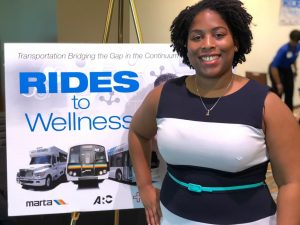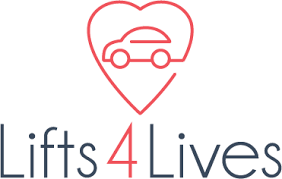
The World Health Organization (WHO) states that “health is not merely the absence of disease, but is the state of complete physical, mental and social well-being.” Recognizing this philosophy, an Atlanta Regional Commission partnership called Rides to Wellness (R2W) used MARTA transit passes as a holistic tool to get patients to healthcare appointments and other quality of life destinations.
With funding provided by the Federal Transit Administration (FTA), the Atlanta Regional Commission (ARC) developed R2W with the goals to increase access to care, improve health outcomes, and reduce health care costs. R2W provided over 36 thousand trips to patients with financial need in the Atlanta area. In addition to critical health care trips, these trips were to the pharmacy, to the park, to see friends and family, or to work.
“I didn’t have money to get to the doctor or get a job, but this helped me get back on my feet and now I am working again,” said one patient in the R2W program.
Transportation is a critical component of healthcare access – if people can’t get to their healthcare appointments, they miss that opportunity for evaluation and potential treatments. This can lead to complications and worsening health outcomes. Transportation barriers also impact access to pharmacies, grocery stores, and even employment opportunities.
The impact R2W had on the community it served was significant. The collaboration between health care and transportation providers not only improved patient health, but also patient quality of life.
“When I first got into the program I could barely use MARTA. I have come a long way. This program empowered me and gave me the courage to even ride my bike and take my bike on the MARTA and meet new people. I am getting out more, and I am able to see the different wonders in our city,” said one patient in the program.

This account shows the lasting impact of reducing the stress of transportation barriers. Having a disability and lacking adequate income are two primary factors that can prevent individuals from accessing transportation in car-centric regions like metro Atlanta. Many people with disabilities do not have the ability to drive a personal vehicle independently, and many low-income residents cannot afford a personal vehicle. Older adults are especially at risk, as they may develop disabilities over time – often as their spending abilities are lowered due to an increased likelihood of living on fixed incomes.
In 2016, almost two million (1,990,928) people lived in the metro Atlanta counties of Fulton, DeKalb, and Clayton. Of these, 10.1% (200,498) were age 65 years or older, and 10.0% (199,607) had a disability. On average, 20.1% of the people in these counties were living below the poverty line, and 9.3% of households did not have access to a vehicle.
To accomplish the R2W goals of improved health outcomes and health care access as well as reduced health care costs, ARC and its partners developed a program that empowered participants to use public transportation with confidence through travel training. The program also increased the opportunity for eligible patients to access healthcare services and other quality of life destinations by providing free transit passes over a six-month period and assisting with enrollment into MARTA’s paratransit and reduced fare programs for qualifying individuals.
Over the 10 months that Rides to Wellness was accepting referrals, we were able to serve over 200 participants in the Atlanta region. 56% of participants were male, 92% of participants were African American, and 32% of participants had a physical or mental disability.

By providing a way to get to appointments, patients saw a 68% improvement in appointment adherence over six months. This means that they were decreasing their appointment cancellation and no-show rates and increasing their attendance rate. As a result, patient’s self-reported quality of life also saw improvement, with patients reporting their health as “good” as opposed to “fair” and showing an average of three healthy days gained after completing the R2W program for the full six months.
The R2W program helped over 200 people make it to their health care appointments without the stress of wondering how they would get there. Beyond that, participants were able to explore outside of their own communities in the city of Atlanta – on their own terms! The program demonstrated how truly great the impact of access to transportation has on a person’s quality of life and provides a model for health care and transportation agencies to better serve their communities.
Although the Rides to Wellness program has ended, my passion for helping people without reliable transportation get to their health care appointments continues through Lifts 4 Lives. Lifts 4 Lives is an advocacy campaign raising awareness about the lack of affordable transportation options for low-income patients and the consequences that come from missing health care appointments. Learn more about how Lifts 4 Lives is bridging the gap between transportation and health care at www.Lifts4Lives.com.



